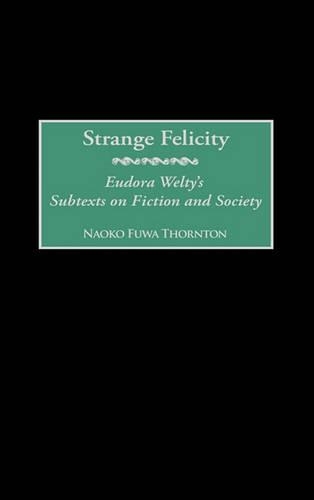
Strange Felicity: Eudora Welty's Subtexts on Fiction and Society
(Hardback)
Publishing Details
Strange Felicity: Eudora Welty's Subtexts on Fiction and Society
By (Author) Naoko F. Thornton
Bloomsbury Publishing PLC
Praeger Publishers Inc
30th August 2003
United States
Classifications
General
Non Fiction
813.52
Physical Properties
Hardback
200
Description
Thornton identifies two kinds of metafictions in Welty's works that testify to the author's confidence in the power of that particular form of fiction to achieve the results she desires. The first deals with literary issues such as language, fiction, readership, and authorship as they are embodied in the particular fiction. The other addresses the social subtexts, which carry the author's social message, or observations, buried beneath the surface story for the reader to excavate. By taking up major works from different stages of Welty's literary career, Thornton reveals the subtexts and, therefore, the author's ideas about the literary and social role of her own fiction. The postmodernist idea that all literary texts are inherently self-reflexive derives from the assumption that a text consists of the surface story and various buried subtexts. Through one or more of those subtexts, the work is considered to be speaking in the author's behalf about itself, or about the fiction or literature of which it is an example. Thornton identifies two kinds of metafictions in Welty's works that testify to the author's confidence in the power of that particular form of fiction to achieve the results she desires. The first deals with literary issues such as language, fiction, readership, and authorship as they are embodied in the particular fiction. The other addresses the social subtexts, which carry the author's social message, or observations, buried beneath the surface story for the reader to excavate. By taking up major works from different stages of Welty's literary career, Thornton reveals the subtexts and, therefore, the author's ideas about the literary and social role of her own fiction. Through a careful examination of the subtexts found in Welty's fiction, the author challenges the notion that Welty was the apolitical, asocial writer that many have thought her to be. Instead, this book reveals how many of the political messages about society, and about different aspects of literature, have been camouflaged by the surface stories that mask Welty's ideas about the social and institutional immorality and unhappiness of the real world. Broken into four parts, Thornton draws on the theories of Bakhtin, Barthes, Bourdieu, Derrida, and Macherey in order to place Welty, and her work, in a new position in the history of American literature.
Reviews
"A sophisticated, knowledgeable, and highly nuanced investigation of theproduction of meaning in Eudora Welty's works through their deliberate self-reflexivity. She makes a good case for Welty's Postmodernity. The book is studded with provocative insights from which all readers of Welty can benefit."-Noel Polk Professor of English at the University of Southern Mississippi author of Eudora Welty: A Bibliography of Her Work and Children of the Dark House: Texts and Contexts in Faulkner
"Like all good literary criticism, this book in the end returns the reader to the primary texts with new enthusiasm and a great many new ideas about how to read Welty's fiction."-Peggy Whitman Prenshaw Frey Professor of English, Louisiana State University
"This is the first full-length work that effectively focuses on subtexts in Welty's writings. It is well-written and accessible to a wide audience. Anyone interested in Welty's fiction will benefit from reading Strange Felicity."-Verbie Lovorn Prevost University of Tennessee at Chattanooga
"Thornton's arguments make a significant contribution to the discussion and understanding of these works."-Carey Wall Professor Emerita of English, San Diego State University
"Thornton's work on the subtexts proves that we have never before seen clearly that Eudora Welty's thoughts were often on her plot and on both literary and social issues at the same time. This book proves that we should read Welty's text and subtexts dialogically. The originality of this thought alone justifies publication, it inspires, and makes Strange Felicity worth reading."-Jan Nordby Gretlund University of Southern Denmark author of Eudora Welty's Aesthetics of Place
[P]rovides readers with a glimpse into Welty's self-reflexivity and reveals the political messages camouflaged in her narratives.-American Literature
Highly recommended. Academic libraries with extensive American literature holdings, upper-division undergraduate level and above.-Choice
"Provides readers with a glimpse into Welty's self-reflexivity and reveals the political messages camouflaged in her narratives."-American Literature
"Highly recommended. Academic libraries with extensive American literature holdings, upper-division undergraduate level and above."-Choice
"[P]rovides readers with a glimpse into Welty's self-reflexivity and reveals the political messages camouflaged in her narratives."-American Literature
Author Bio
NAOKO FUWA THORNTON is Professor of English and Comparative Literature at Japan Women's University in Tokyo. She has published Japanese translations of Welty's The Golden Apples and The Ponder Heart.
